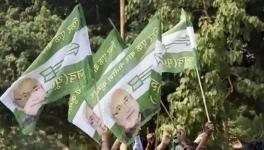Book Review: Zero Mile, Patna
While working on my PhD, one of the biggest struggles was finding relevant literature on the city of Patna in fiction and non-fiction formats. Although the city in the previous decade saw some notable writing, particularly in Urdu, the practice declined, as did Patna. We did have the occasional remarkable writing by Arvind Das in his Republic of Bihar or the piece by Renu on Patna floods in the 1970s in Hindi.
In celebrity writers, social media-driven and publishing house-sponsored books, we often overlook ordinary writings and expressions. The book Zero Mile, Patna by Sanjay Kundan is an essential addition to the writing on the city in Hindi. Vaam Prakashan has published it as a part of their series on less written cities of India, which is a much-needed and welcome addition. The author, a poet and novelist, lives in Delhi and writes about the city of Patna to reconnect in ways he has not been able to connect with Delhi even after all these years.
Written in the form of notes, it gives the reader insight into Patna in its most banal, rudimentary details- something which will make sense only in its collective form. The book's format is structured similarly, with small writings on people, places, festivals, functions, and incidents. It sketches out simple details about the everyday city of Patna in the 1970s and 1980s, primarily through the common person's life, through the author himself. It does the needful in Hindi, a language which can adequately express and capture the city because the colloquial can never be expressed enough in another language. To an outsider, it holds a metaphor when the author reminiscences how they would call the biscuit coming out of the local bakery as Danda biscuit, which has transformed into rusk for the market over the years.
Zero Mile, Patna is not some profound piece of literature nor a benchmark in literary writing. And yet, it is an important and relevant addition to the work done on Patna. The author helps us remember the ordinary sites of Patna, the mornings and evenings and its daily engagement, which has forever been a spatial extension of its rural affiliations and parochial ties. The author underlines the city’s various engagement with theatre, music and art and sites of neighbourhoods which facilitated it. He recalls listening to great artists like Kumar Gandharv, Sitara Devi and Kishan Maharaj during the Durga Puja festival, which was organised by different groups and at one point was the high point of Durga Pujas being organised across the city; when people could walk in from one musical program to another the whole night.
Lefebvre defines representational spaces as part of our everyday geography created by cultural practices and experiences, and mapping those spatially and historically is an important contribution this book makes. The author writes and reflects on such cultural aspects of the city and how they shaped his formative years and those around him. He goes on to describe people who were government employees, doctors, lawyers, and teachers and constituted part of these cultural landscapes. The art form was not something separate to be performed by someone else in a defined space. It was there in the city.
From musical nights during Durga Puja to the nukkad natak, theatre and other forms of performance in Gandhi Maidan, it is an enriching account of what constituted the ‘urban’ in non-metropolitan cities of India. As the author describes, the man selling small artefacts in Gandhi Maidan was the best Qissago (storyteller) he ever came across. One also realises the loss of Gandhi Maidan, open ground or lawn as it was earlier called as a public space for fiery speeches to resting spaces for those who had a night train to catch from Patna junction. Today it has turned into a smart city project with the installation of LED TV and barricades completely running its idea of public space.
To be able to notice the arrival of paneer and soup in our marriage dinners, to the description of different artist groups coming together, and to free the Premchand Rangshala from police encroachment, the narrative is all-encompassing. It makes one reflect on how far the material culture of our lives has changed and the market has invaded rudimentary practices. Therefore, in a world of commodification and materialist preoccupations, the book unintentionally is a perfect ode to the city's sustainable social structures, which not only occupied our lives and livelihood practices but ensured its renewability.
It is now that one has woken up to terminologies like circular economy. Still, the author recalls when the hawker roaming in his mohalla would let him buy something from his fare in exchange for an old, used notebook or magazine.
Through his writing about the city, Kundan looks at himself to understand the person he is and what made him the individual he became, of innumerable baithkis he attended in houses of teachers, poets and artists. One could walk into someone's house for a discussion without a phone call or the hosting protocols. He believes that these kinds of interactions and adda-bazi made Patna a pro-people city. Perhaps that is what the author should have done more, in detail, and it is in the latter part of the book, describing the current city when the book loses its strength because it becomes sporadic and disconnected. Yet, it is an important contribution to the sparsely populated world of literature on small and medium towns of India.
Sheema Fatima is a post-doctoral Fellow at Tata Institute of Social Sciences-University College India, UK. Her research is on small and medium towns of Bihar.
Get the latest reports & analysis with people's perspective on Protests, movements & deep analytical videos, discussions of the current affairs in your Telegram app. Subscribe to NewsClick's Telegram channel & get Real-Time updates on stories, as they get published on our website.
























